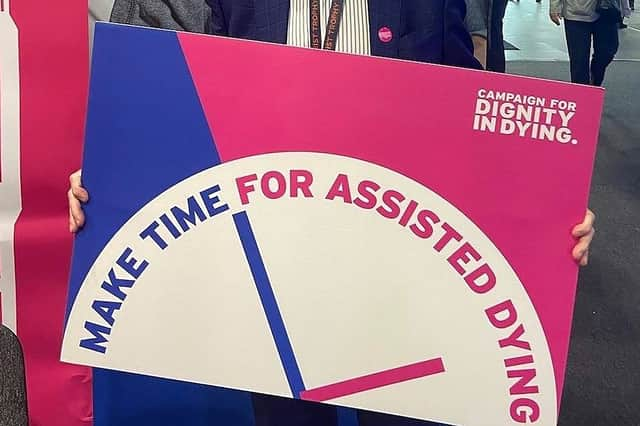Assisted dying on the verge of becoming legal in the British Isles as Isle of Man bill wins 70% of vote
and live on Freeview channel 276
Assisted dying is on the verge of becoming legalised in the British Isles. The Isle of Man is now on the path to become the first part of the British Isles to legalise assisted dying but this is unlikely to be an option for Esther Rantzen.
If it becomes law, assisted dying in the Isle of Man is also unlikely to become like Switzerland, the preferred destination for one Briton every eight days seeking to end their suffering by legal assisted dying. Initially, it will only available be for people who have been resident on the Island for at least a year.
Advertisement
Hide AdAdvertisement
Hide AdThe Assisted Dying Bill won 70% of the vote at its Second Reading in the Tynwald, the Isle of Man’s Parliament, as an option for its terminally ill, mentally competent citizens, subject to strict safeguards. Assisted dying is different from euthanasia. Assisted dying involves providing assistance such as drugs, to terminally ill individuals who wish to end their own lives, while euthanasia involves a third party directly carrying out a deliberate act of ending the individual's life.
According to the Campaign for Dignity in Dying most Britons would prefer to end their lives at home with their families let alone travel to another country and pay over £10,000. Currently, however, under the Suicide Act 1961 in England and Wales, it is a criminal offence to encourage or assist another person’s suicide.
Esther Rantzen and others are campaigning for a change in the law as there is clearly an increasing need. UK membership of Dignitas, the Swiss assisted dying association, jumped to 1,900 people in 2023, according to the organisation. That is a 24% rise on the previous year.


The Isle of Man is a self-governing British Crown with its own parliament, government and laws largely independent from the United Kingdom. The King, who is ‘Lord of Mann’, is the Manx Head of State and is represented on the Island by the Lieutenant Governor.
Advertisement
Hide AdAdvertisement
Hide AdThe Isle of Man’s legislative system was introduced in around 800 AD, making it the oldest parliament in the world with an unbroken existence. Apart from its low taxation it has had some other notable laws unique from the UK. For example, it was the first country in Europe to allow women to vote, and up until 1993 it allowed corporal punishment - "The Birch".
There is no absolute requirement that Manx law has to be ratified by Westminster but new legislation does require Royal Assent. The Ministry of Justice also examines each piece of legislation to ensure there is no conflict with the UK’s international obligations (including the (Convention on Human Rights).
If there's no objection from the Crown or Westminster the next stage of the bill will a public announcement by the Isle’s Parliament on the July 5 at the ancient Tynwald Day open-air ceremony. The Lieutenant Governor presides, putting Acts of Tynwald into effect and receiving Petitions for Redress. If accepted assisted dying could be a reality in early 2025.
Scotland could later follow suit as a bill that lets terminally-ill people end their lives was introduced in the Holyrood Parliament was also been approved for further consideration.
Advertisement
Hide AdAdvertisement
Hide AdIn the meantime, according to the Dignity in Dying campaign group, more than 200 million people around the world have legal access to some form of assisted dying. Switzerland's Dignitas facility began operating in 1998. Assisted suicide is also legal in Austria, Spain, The Netherlands, Belgium and Luxembourg. In the US, 11 states allow assisted dying. Known as "physician-assisted dying", it permits doctors to prescribe lethal drugs for self-administration.
In Canada medical assistance in dying is also legal as is the case in Colombia, some parts of Australia, but the law differs across states. New Zealand's End of Life Choice Act legalises assisted dying and allows adults in their final months of life to request assistance from a medical professional.
Obviously helping someone to end their life is a very sad topic but as Esther Rantzen highlights, medical organisations and politicians burying their head in the sand on this issue are just ignoring the wishes of many terminally ill people suffering the indignity of pain and distress.
Comment Guidelines
National World encourages reader discussion on our stories. User feedback, insights and back-and-forth exchanges add a rich layer of context to reporting. Please review our Community Guidelines before commenting.
